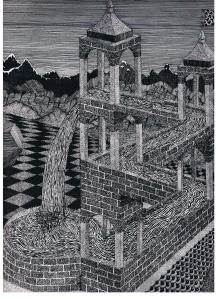At Liverpool, during my first year at the university, one of the compulsory modules was Interpreting Poetry. Each Monday morning we met to look in depth at a single poem, for two hours.
There were nine poems, chosen chronologically to demonstrate the development of poetry. Beginning with Beowulf and ending with Sylvia Plath’s Daddy, it was an introductory selection of well-known titles. We read them so that the tutors could introduce us to various theories, and we read them so that we could practice critical responses. We looked at what a poem said and how it said it, and we wrote some short essays.
Did you note that, ‘short essays’ phrase? It trips so glibly off the tongue that it’s easy to  miss the significance of it. What it refers to are pages of interpretations about a single piece of writing. Most of those poems, even stretched out carefully, did not fill a single sheet of paper, but we found a lot to say about them.
miss the significance of it. What it refers to are pages of interpretations about a single piece of writing. Most of those poems, even stretched out carefully, did not fill a single sheet of paper, but we found a lot to say about them.
Poet, I read in my notes from those classes, comes from the Greek, ποειν (poyine), meaning to make, to create, to produce, to compose, to write. Reading further, I find that what distinguishes poetry from prose, is the presence of a rhythm and/or rhyme scheme.
The Oxford English Dictionary defines the noun Prose as,
Language in the form in which it is typically written (or spoken), usually characterized as having no deliberate metrical structure (in contrast with verse or poetry).
There’s a more comprehensive comparison on Wikipedia, if you’re interested in going further down that road.
However, I’m going back to the OED, where I find that the first written reference to ‘prose’ is in the Wycliffite Bible of 1382. As I travel down the next eight definitions of prose, and (incidentally) the next seven centuries, prose takes on additional meanings. It is a story, narrative or statement: it is plain, simple and matter of fact; (often with negative connotations) and even, dull, commonplace or turgid. Poor old prose, what a litany.
Taken alone, the plain, simple and matter of fact might seem to be something to aspire to: perhaps to imply truthfulness. But I can’t say I like the rest. Besides, poems also tell truths, don’t they?
So I check out the compounds section. Phew, this sounds more creative. All I have to do is put prose with another word, such as book, satire, work, author, dramatist, or fiction.
Well that’s a relief, for a moment there it looked like prose was not going to add up to much. Maybe I could aspire to be a prose-poet writing poetic-prose. The OED defines that as, ‘writing that has a poetical character.’ Hmm. So that’s what those nine weeks of studying were for.
All I have to do is apply the principles I learned through deconstructing other people’s poetry to my writing. Simple.
Isn’t it?
